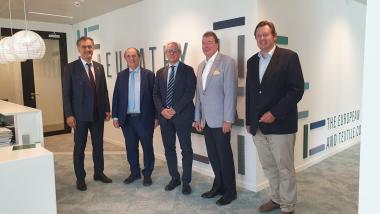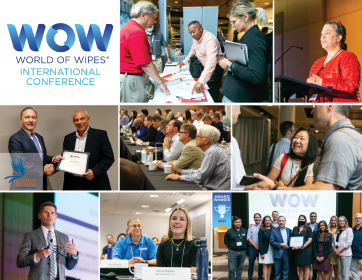Virtual RISE Conference Highlights
- Next-Gen Technologies for Nonwovens/Engineered Materials
- Canopy Respirator from Canopy Wins Innovation Award
145 professionals in product development, material science, and new technologies convened for the 11th conference edition of RISE®—Research, Innovation & Science for Engineered Fabrics, held virtually, Sept. 28-30. The event was co-organized by INDA, the Association of the Nonwoven Fabrics Industry, The Nonwovens Institute, and North Carolina State University.
The program focused on Nonwoven Material Science Developments, Sustainability, Increasing Circularity, Promising Innovations, Process Innovations, Material Innovations, Government/NGO Challenges to Single-Use Plastics, Machine-Assisted-Learning Development of Biopolymers, and Market Intelligence and Economic Insights.
Participants praised the high-quality program content, in-depth round table discussions, networking and Q&A’s where participants ask expert speakers questions pertaining to their focused presentations.
Highlights among the 26 presentations included
- Sustainable Solutions for our Plastic Planet Predicament, by Marc A. Hillmyer, Ph.D., McKnight Presidential Endowed Chair, University of Minnesota;
- Closed-Loop Recycling Pilot of Single-Use Face Masks by Peter Dziezok, Ph.D., Director of Open Innovation, Proctor & Gamble;
- Innovating a Sustainable Future for Nonwovens: A European Perspective, by Matt Tipper, Ph.D., CEO, Nonwovens Innovation & Research Institute (NIRI);
- Phantom Platform: The Polyolefin-cellulose Coformed Substrates Technology, by Fabio Zampollo, CEO and Founder of Teknoweb Materials;
- Guiding Environmentally Sustainable Innovations – From Reactive to Proactive Life Cycle Management, by Valentina Prado, Ph.D., Senior Sustainability Analyst, EarthShift Global LLC;
- High-Loft, Ultra-Soft Hygiene Solutions, Paul E. Rollin, Ph.D., Senior Principal Scientist – Global Hygiene, Propylene-Vistamaxx-Adhesion (PVA) Global Technology, ExxonMobil Chemical Company;
- Canadian Plastic Policy Update, by Karyn M. Schmidt, Senior Director, Regulatory & Technical Affairs, American Chemistry Council (ACC).
Other highlights included the announcement of Canopy Respirator as the winner of this year’s RISE® Innovation Award winner. The annual award recognizes innovation in areas within and on the periphery of the nonwovens industry which use advanced science and engineering principles to develop unique or intricate solutions to problems and advance the usage of nonwovens.
RISE® Innovation Award Winner
The RISE® Innovation Award was presented to Canopy for their Canopy Respirator. The productis an innovative respirator that is fully mechanical, non-electrostatic, with a filter designed for superior breathability while offering the wearer facial transparency. The breakthrough respirator features 5.5mm water column resistance at 85 liters (3 cubic feet) per minute, 2-way filtration, and a pleated filter that contains over 500 square centimeters of surface area. The patented Canopy respirator resists fluids, and eliminates fogging of eyeglasses.
INDA, Association of the Nonwoven Fabrics Industry
































